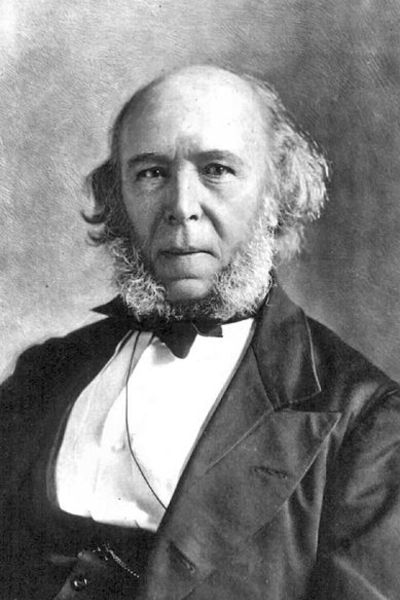Liberty Matters
A Preliminary Reply to Alberto Mingardi, Roderick Long, and David Levy
 My thanks to the three commentators for their thoughtful remarks. They raise different issues about Spencer’s ideas, most of which deserve careful consideration. Unfortunately, it will take me a little time to cover the topics adequately, so rather than delay the discussion, I am posting this brief preview to get things started. I will state my points in the briefest possible terms and will include no citations. All of that will come later in separate posts, beginning in a few days, as I discuss some of the more important topics one by one.
My thanks to the three commentators for their thoughtful remarks. They raise different issues about Spencer’s ideas, most of which deserve careful consideration. Unfortunately, it will take me a little time to cover the topics adequately, so rather than delay the discussion, I am posting this brief preview to get things started. I will state my points in the briefest possible terms and will include no citations. All of that will come later in separate posts, beginning in a few days, as I discuss some of the more important topics one by one. Alberto Mingardi asks: “Why, then, did 20th-century classical-liberals not pick up on Spencer?” Although Mingardi cites Albert Jay Nock as an exception, he wonders why Spencer’s influence was not more widespread among modern classical liberals, and he presents a couple of possible answers. My short reply is this: Spencer’s influence on the revival of classical liberalism was fairly extensive. This was especially true among Georgists, such as Frank Chodorov, but it also extended to non-Georgists, such as Murray Rothbard, who often cited Spencer’s Law of Equal Freedom. Of course it may be said that, apart from the Land Question and the Law of Equal Freedom, Spencer’s influence did not run very deep, philosophically speaking, but I will postpone discussing this issue. Unfortunately perhaps, Spencer exerted far more influence on later sociological thinking than he did in the realm of political philosophy.
I agree with most of Roderick Long’s points, and whatever disagreements I may have are quite minor, amounting perhaps to nothing more than a different emphasis here and there. I will, however, mention two points. First, the problems with Spencer’s organismic analogies run deeper than Long may think. Second, I understand that classical liberals other than Spencer discussed the unintended benefits of war, but I don’t think that Spencer’s views on this matter follow necessarily from his broader sociological and moral principles. In fact, I might go so far as to say that his claims about the unintended benefits of war during earlier stages of social evolution are inconsistent with key features of his overall approach to social and moral progress. More, much more, on this later.
David Levy begins his paper with what, in my view, is a peculiar claim. He says that “Spencer did seem to have an important role to play” in the development of eugenics because A.R. Wallace mentioned some ideas he had picked up from Spencer’s writings, especially Social Statics. Well, if Wallace’s “perusal” of Social Statics gave him some ideas about eugenics, then that was his doing, not Spencer’s. People frequently get ideas from reading books that were never put forward or defended by the authors. Indeed, I don’t believe that Spencer ever mentioned eugenics (or the ideas associated with it) anywhere in his writings. Moreover, Spencer repeatedly made the point that human intervention in social progress may retard that progress, but it can never speed it up beyond its normal evolutionary rate. (Here as elsewhere, I shall provide some citations later on.) As for the suggestion that we should “deaden sympathy to allow natural selection to work its progressive magic”—this was the exact opposite of what Spencer had to say about sympathy in all of his writings on the subject, both early and late.
Much of the remainder of Levy’s essay discusses Spencer’s utilitarianism. Levy claims that it is “safe to read Spencer from Social Statics onward as a utilitarian.” I agree with this remark, provided we keep in mind the substantial differences between Spencer’s own “rational utilitarianism” and his understanding of Benthamite utilitarianism, or “the doctrine of Utility as commonly understood,” which he dubbed “empirical utilitarianism.”
Levy also mentions a conflict between Spencer and Mill “over the role of necessary truths.” I don’t think Levy quite understands Spencer’s rather peculiar conception of necessary truths, but that will take me a while to explain.
Copyright and Fair Use Statement
“Liberty Matters” is the copyright of Liberty Fund, Inc. This material is put on line to further the educational goals of Liberty Fund, Inc. These essays and responses may be quoted and otherwise used under “fair use” provisions for educational and academic purposes. To reprint these essays in course booklets requires the prior permission of Liberty Fund, Inc. Please contact oll@libertyfund.org if you have any questions.